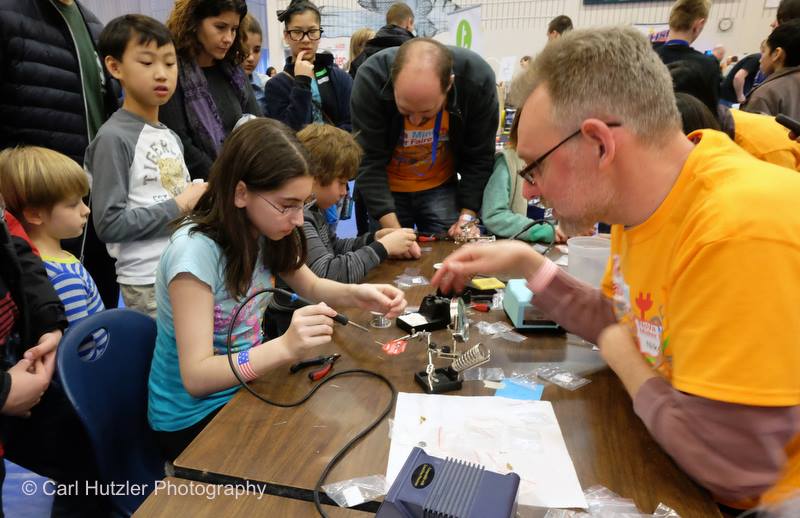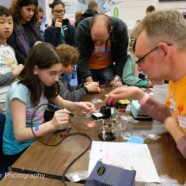‘Maker Faires’ Encourage Kids to Create
Hands-on creations from robots to rockets were highlighted at a Northern Virginia Maker Faire. Artists, inventors and hobbyists shared their knowledge of things they make themselves, which included science innovations. At the faire in Reston, Virginia, children discovered that science can be both informative and fun.

Children of all ages had the chance to solder their first electronics project. (Courtesy photo: Carl Hutzler Photography)
With metallic conductive thread, a girl creates a simple electronic circuit. Artist Sally Byers incorporates tiny lights like this in her clothing designs. She said the art of making things yourself is disappearing and hopes the younger generation will continue to create whatever moves them.
“I want them to learn that they can make it happen whatever it might be, that they can do all kinds of stuff, but I’m not sure they learn that in school,” said Byers.
But they can learn it at Maker Faires, which began in the United States eight years ago as a gathering for people who enjoy creating and sharing. Now, the faires have spread worldwide to countries like Nigeria, China, and Egypt.
Lorelei Brown, media coordinator for this event, said faires provide a creative outlet in a world full of ready-made goods.
“This kind of thing gives people an incentive to do something, and maybe to change a thing, or think differently,” said Brown.
Robots, such as drones that flew and robots designed like the Mars Rover that the children could control, were popular at the faire. Engineer Ivan Galysh said the robot can be built from a kit.
“They actually have a rocker suspension system designed to go over rough terrain, uneven terrain and keep all four wheels on the ground,” said Galysh.
Nine-year-old Mamoun Kolovos enjoyed learning about the robots.
“How they go through the ramps and how fast you can make it go or rotate it around,” said Kolovos.
At a display sponsored by a high school team that builds high-powered, motorized rockets, kids are propelling pieces of plastic representing small rockets. Senior Alison Yu shows off their homemade creations. She said the team did a project with NASA, the U.S. space agency.
“Our body tube is made out of cardboard-like materials. Because we design our own pieces we bought the materials and also cut them ourselves. The rocket we did for our project went about 3600 feet,” said Yu.
Yu plans to become a rocket scientist. Faire organizers hope today’s activities launch lots of the young people here into exciting, creative careers.
(Deborah Block)

